


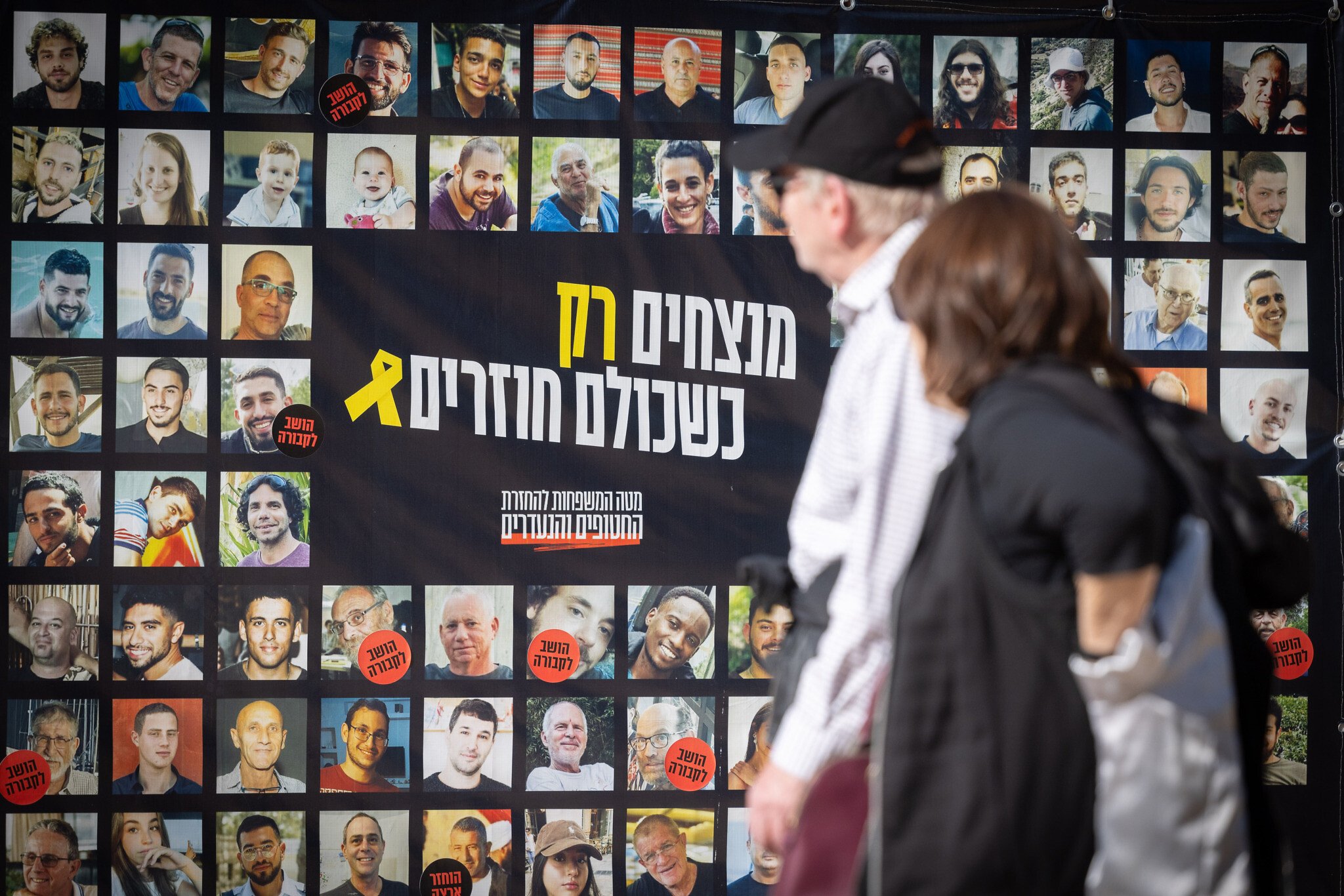
A list of 34 names of Israeli hostages held in Gaza who could be released in the first stage of an elusive ceasefire agreement with Hamas was published by a Saudi news outlet Monday, after the Palestinian terror group apparently leaked the document amid reports that negotiators were moving closer to sealing a potential hostage release and ceasefire deal.
The roster was swiftly downplayed by Prime Minister Benjamin Netanyahu, whose office said the list had been given to the mediating countries in July; on Sunday reports indicated that Hamas had okayed the months-old lineup while refusing to provide information on the state of the hostages, which Israel insists on getting before any agreement moves forward.
“To date, Israel has not received any confirmation or comment from Hamas regarding the status of the hostages on the list,” the PMO stated.
Separately, a spokesman for Netanyahu said leaks emerging from recently resumed talks in Doha indicating progress was being made were “spin” by the terror group, and urged the media to ignore Hamas’s “propaganda and psychological terror.”
A-Sharq al-Awsat, a Saudi-owned daily based in London, published a picture of what it said was a list of names to be released in the first stage of a deal, divided into three sections and ranging in age from 1-year-old Kfir Bibas to Shlomo Mansur, 86. It also included the names of two civilians held in the Strip since entering of their own accord in 2014 and 2015: Avera Mangestu and Hisham al-Sayed.
Other outlets, including Reuters and the BBC, said they had been given the list by Hamas, while declining to detail the names. According to Reuters, the list included “10 women and 11 older male hostages aged between 50 and 85, as well as young children that Hamas previously said had been killed in an Israeli airstrike,” an apparent reference to the Bibas children. Hamas has never offered proof that they were killed.
The BBC noted that Hamas has refused to say who on the list is alive.
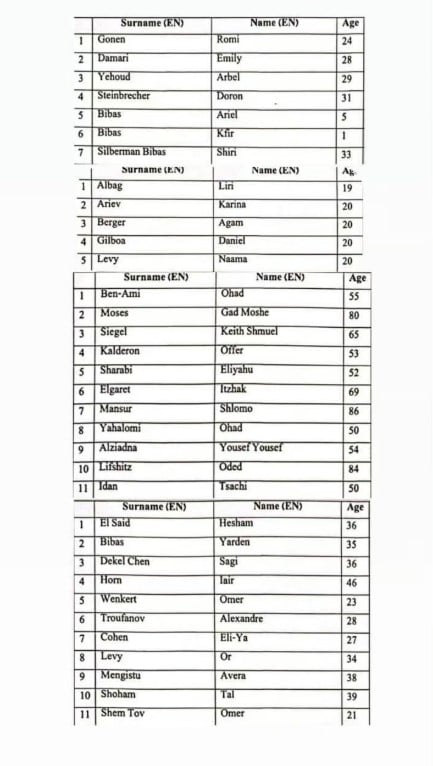
The names included 12 women and children:
Romi Gonen
Emily Damari
Arbel Yehud
Doron Steinbrecher
Ariel Bibas
Kfir Bibas
Shiri Silberman Bibas
Liri Albag
Karina Ariev
Agam Berger
Danielle Gilboa
Naama Levy
It also included 11 older men:
Ohad Ben-Ami
Gad Moshe Moses
Keith Siegel
Ofer Calderon
Eli Sharabi
Itzhak Elgaret
Shlomo Mansur
Ohad Yahalomi
Yousef Yousef Alziadna
Oded Lifshitz
Idan Tsachi
And another 11 men under 50:
Hesham El-Said
Yarden Bibas
Sagui Dekel-Chen
Iair Horn
Omer Wenkert
Alexander Troufanov
Eliya Cohen
Or Levy
Avera Mengistu
Tal Shoham
Omer Shem-Tov
Talks have largely revolved around a proposed three-stage deal in which “humanitarian” cases, including women, children and the infirm, would be released first, followed by Israeli men of fighting age and then the remains of those killed during the October 7 onslaught or while in captivity. Israel would agree to release an unspecified number of Palestinian prisoners, while also redeploying its forces and ending the fighting in Gaza.
The Hostage Families Forum, which has lobbied for all approximately 100 hostages to be released together, said following the publication of the list that it was “shaken and upset,” reiterating its call for a comprehensive deal.
Family members of those not on the list compared it to the “selection” process that took place in death camps in the Holocaust.
“We cannot believe that Israel would leave hostages behind,” Anat Angrest, the mother of hostage Matan Angrest, told the Ynet news site. “I can’t believe that my son who was wounded in battle would not be released in the humanitarian stage.”
“We have a grandfather who knew what selection was and what it means to choose between blood and blood. The selection today is by the government of Israel, not the Nazis,” she said.
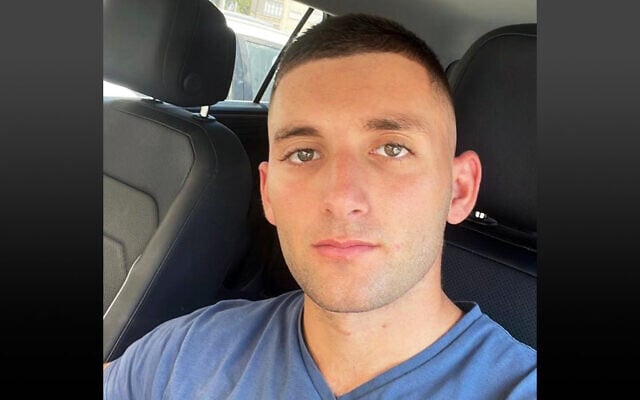
Talks have largely been stuck over a number of issues, but the Haaretz daily reported Monday that Israel was increasingly optimistic about the chances of a deal and that talks were heading to a conclusion.
According to unnamed sources cited by the newspaper, Israel had proposed a partial deal in order to bypass Hamas’s demand for an end to the war and a complete withdrawal of Israeli troops from Gaza.
The report said Netanyahu and senior figures were still deciding whether Mossad chief David Barnea, who has headed the Israeli negotiating team, should fly to Qatar for the talks.
Other reports also indicated progress in the talks, but in a statement posted to social media late Sunday night, Netanyahu’s spokesman cautioned against reporting on Hamas leaks from the negotiations.
“So what did we have today,” Omer Dostri wrote. “The Mossad chief is flying to Qatar, the Mossad chief is flying to Qatar tomorrow, Hamas transferred the list of hostages, and more spins and lies from the terrorist organization Hamas.”
Such reports give false hope to the families of hostages, he charged. “The negotiations in Qatar continue, in a gradual manner, in a slow manner.”
US Secretary of State Antony Blinken also voiced confidence Monday that a ceasefire deal in Gaza would come together eventually, while noting that it may not happen until after President Joe Biden leaves office on January 20.
Blinken, who tried repeatedly last year to broker a ceasefire between Hamas and Israel, said that the Biden administration “will work every minute of every day” until the end of its term to secure a hostage deal.
“We very much want to bring this over the finish line in the next two weeks,” Blinken told reporters on a visit to Seoul.
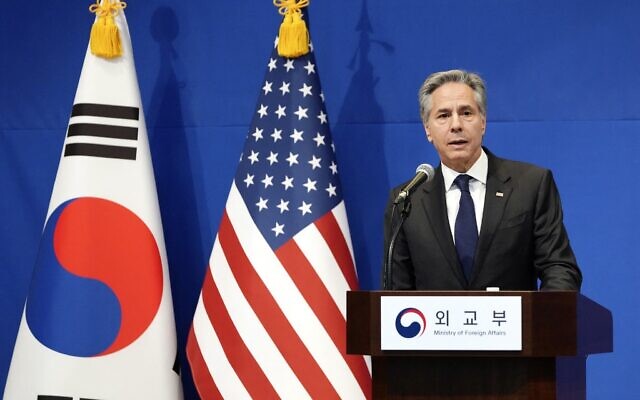
“If we don’t get it across the finish line in the next two weeks, I’m confident that it will get its completion at some point, hopefully sooner rather than later,” Blinken said.
“When it does, it will be on the basis of the plan that President Biden put forward and that virtually the entire world supports.”
US President-elect Donald Trump, who takes office on January 20, has vowed even stronger support for Israel and has warned Hamas of “hell to pay” if it does not free the hostages seized in the October 7, 2023, Hamas-led onslaught that killed over 1,200 people and saw the kidnapping of 251 hostages, sparking the war in Gaza.
Blinken said there had been an “intensified engagement” by Hamas on reaching a deal, but that it was not yet complete.
“We need Hamas to make the final necessary decisions to complete the agreement and to fundamentally change the circumstance for the hostages, getting them out, for people in Gaza, bringing them relief, and for the region as a whole, creating an opportunity to actually move forward to something better,” Blinken said.
Reports citing Hamas and Israeli officials Sunday evening claimed the terror group had agreed with Israel on a list of 34 hostages to be released in the first phase of a potential ceasefire deal, though Hamas continued to refuse to detail who among them was alive.
After a Hamas official was cited by the Reuters news agency as claiming the terror group had supplied such a list, Netanyahu’s office quickly denied it and said that “as of now, Hamas has not given a list of hostages.”

Subsequent reports made clear that rather than supplying a list of names, Hamas had indicated that a list of 34 names sent by Jerusalem several months ago was acceptable to it, but that Israel viewed the information as incomplete.
Citing an unnamed senior Israeli official, the Walla news site reported that Hamas had approved the list in exchange for an “appropriate price” — meaning the number of Palestinian security prisoners to be freed as part of the deal — but refused to say who of the hostages was alive and who wasn’t, making it impossible to determine what price would be appropriate.
The AFP news agency reported similar details, quoting an unnamed Hamas official who demanded a weeklong truce in order for the terror group to determine who on the list was alive.
“Hamas has agreed to release 34 Israeli prisoners from a list presented by Israel as part of the first phase of a prisoner exchange deal,” the official said, adding, however, that Hamas needed time to determine their condition.
“Hamas has agreed to release the 34 prisoners, whether alive or dead,” the official said. “However, the group needs a week of calm to communicate with the captors and identify those who are alive and those who are dead.”
Israel is highly unlikely to agree to halt the fighting for a week without a finalized deal.
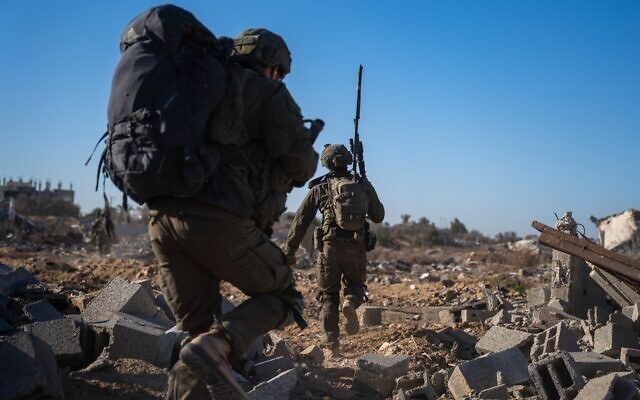
Negotiators are looking to achieve a halt to the 15-month-old war, together with the release of 100 hostages still held captive by Gazan terror groups, 96 of whom were kidnapped on October 7.
According to the Israel Defense Forces, at least 34 hostages kidnapped on October 7 are no longer alive. Hamas is also holding the bodies of two soldiers killed in 2014.
The Hamas official who spoke to Reuters on Sunday insisted that any deal was contingent upon the complete withdrawal of Israeli troops from Gaza and a permanent ceasefire, claiming that there had been no progress from the Israeli side in this regard.
Netanyahu has insisted throughout multiple rounds of failed negotiations that Israel will not commit to a complete end to the war and has said that the fight against Hamas will resume at the conclusion of any deal that is reached.
Multiple reports said Sunday that White House Mideast czar Brett McGurk was already in Doha, Qatar, for the negotiations, claiming Barnea was expected to head there as well. Channel 12 news said Barnea would arrive on Monday or Tuesday.
Netanyahu has held a series of security discussions in recent days on the hostage talks, with Channel 12 reporting that Defense Minister Israel Katz, IDF Chief of Staff Herzi Halevi and Strategic Affairs Minister Ron Dermer were in attendance.
The Walla and Axios news sites also reported Sunday that Dermer is expected to travel to the US this week to meet senior officials from the White House and Trump’s incoming administration.
Among the outstanding issues in talks is how Gaza will be governed following the end of the war, with Israel vowing to eradicate Hamas rule and suspicious of a Palestinian Authority administration taking its place.
The Saudi Al-Hadath news outlet reported, citing sources from the Israeli delegation to Qatar, that Jerusalem could agree to grant Hamas leaders immunity and refrain from targeting them abroad if the group agrees to relinquish its governance of the Gaza Strip and move abroad.
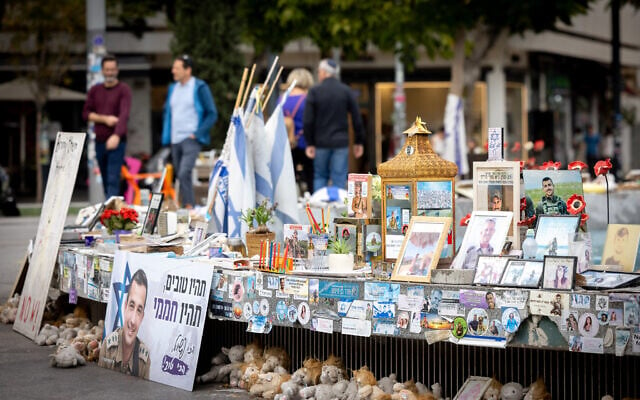
The report added that in place of the terror group, Gaza would be controlled by “an independent Palestinian body,” the report stated, in coordination with the international community. An international peacekeeping force, similar to UNIFIL in Lebanon, would be established in this scenario and the US would be responsible for overseeing the implementation of such an agreement.
Hamas released 105 civilians during a weeklong truce in late November 2023, and four hostages were released before that. Eight hostages have been rescued by troops alive, and the bodies of 38 hostages have also been recovered, including three mistakenly killed by the Israeli military as they tried to escape their captors.
